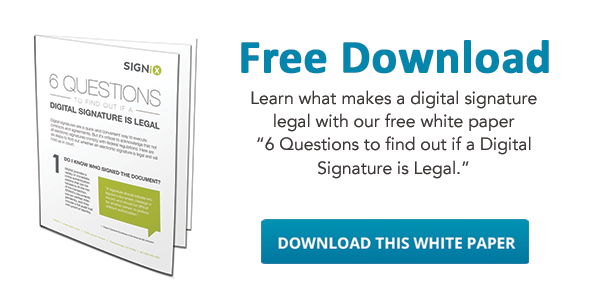In an age when electronic signatures are gaining steam across many industries, it’s easy to get swept away by the desire to get documents signed online.
There are plenty of reasons to get excited about this technology, but it’s important to understand the pros and cons of electronic signatures before deciding if they’re right for your business.
The Pros of Electronic Signatures

They’re easy to use. Getting documents signed online is fast and easy for you, your employees and your customers. Most electronic signature software is intuitive, which means you don’t have to waste time getting trained on how to use it.
They speed up the pace of business. Instead of waiting for documents to be sent by courier around the globe, your contracts can be signed and delivered with electronic signatures in a matter of seconds.
They improve document accuracy. It can be frustrating to get a document signed only to realize the signer has missed a page or forgotten to fill out some vital information. With electronic signature software, you can enable mandatory fields. That means you can be sure your documents are 100% complete every time. So say goodbye to the days of tracking down your customers and partners to re-send or re-sign incomplete documents.
They save time and money. Most businesses spend a good amount of time shuffling paperwork, and it’s an unnecessary waste of time. With electronic signature software, you can send documents out for signature in minutes, track the documents’ progress and save the finished documents for future reference. This gives you more time to spend on building relationships with your customers instead of shuffling paperwork. Not to mention the cost reduction for printing, faxing and mailing documents.
They enhance customer services. With electronic signatures, your customers can sign documents anytime, anywhere on any device. This technology makes it faster and easier to interact with your business, which is especially important for younger customers.
The Cons of Electronic Signatures
Some have limited storage options. Some electronic signature vendors require that you store your documents on their servers forever. This is a concern for many businesses that want to control where their customers’ personal information is stored. You should make sure your electronic signature vendor is able to hand over control of your documents and digitally shred copies from their servers according to Department of Defense standards.
Security varies depending on vendor. Not all electronic signature vendors offer enough security for business transactions. The most basic type of electronic signature offers no security against tampering, while others offer some basic tamper protection. But only one signature technology offers the highest level of security—a specialized type of electronic signature called a digital signature. Learn more about the types of electronic signatures in this blog post. You should be wary of low-security electronic signature products.
Some use proprietary software. Many electronic signature services rely on proprietary software. This can pose a problem for businesses that don’t want to be locked in to one vendor for electronic signatures. To avoid this problem, pick a vendor that complies with the Digital Signature Standards set by the National Institute of Standards and Technology. These signatures are embedded into your documents, which means you have the freedom to switch vendors down the road if you want to.
If you consider these pros and cons of electronic signature software you can be sure to make an educated choice on whether this technology is right for your business.
%20formatted-1.png?width=582&height=170&name=SIGNiX%20Logo%20Main%20(white)%20formatted-1.png)

